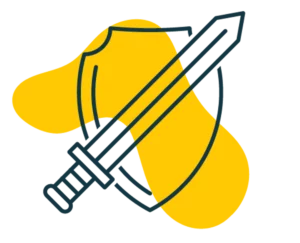
How did you start in cybersecurity?
I’ve had a passion for computers in general since I was young. I had the opportunity to attend a high school that focuses on specializations similar to programs in a university system. I got into my high school’s computer science classes for three years, learning the basic foundations of computer science. After that, I had a chance to go to Zayed University, where I got into the IT Security Networking program and graduated with my bachelor’s degree.

How did you find out about the Certified Cyber Incident Response Manager (C-CIRM) program with the British University in Dubai (BUiD)?
During my university journey, I had to complete an internship. I got into the Raytheon Emirates internship program where we focused on digital forensics. During that program, I had my first experience with the Project Ares cybersecurity education platform and got to use Project Ares battle rooms in our hands-on labs. We focused on Battle Room 8- Network Traffic Analysis (opens new window), Battle Room 9- Forensics (opens new window), and Battle Room 11- System Security Analyst (opens new window).
We learned more about cybersecurity and different career paths, like Incident Response, during our course with guest instructor Michael Kaplan of Phase 2 Advantage. Mr. Kaplan gave us an overview of an incident responders’ responsibilities: documenting incidents, communicating with other teams, and laws and standards involved in these situations.

What interested you in C-CIRM certificate with the BUiD?
About 3 months after my Raytheon internship, I got my first job with a cybersecurity company and within my team we have incident response roles. I’m very interested in incident response but I’m also actively working on learning about other roles. For example, I’m very focused on enterprise incident management. In my current position, I need to know about the operations of other teams and this certification has shown me the big picture of how a security incident can be managed in the most effective way possible.
When I interact with our incident response team, I understand why they’re doing what they do, the steps they may take, and what processes they will use to resolve a security incident. It’s critical for teams to communicate verbally, write reports, and present results efficiently.
The C-CIRM certification has allowed me to be recognized as an employee who understands incident response and has helped me to become a more educated professional.

What did you learn from the BUiD Incident Response Course?
The course helped me to gain knowledge and connect the dots between what we studied in the course and how my current organization works in the real world. The course made it simple for me to understand incident response procedures and protocols.

How was the BUiD course different from other courses that you’ve taken in your cybersecurity education?
This course offered a lot of valuable information on a high level and focused in on the realities that cybersecurity professionals are facing right now in 2022. It’s not a generic course that focuses on general information only and I think that’s the key difference between this course and others that I’ve experienced.

How long did it take you to obtain your C-CIRM certificate after completing the prep course?
It took me about two months to study and prepare for the exam since I was balancing work at the same time. During that time, I reviewed the course books and continued reading and preparing myself for the test. I also took practice tests and quizzes that Mr. Kaplan had shared with us.
After I practiced and tested my knowledge, I sat for the exam and finished it in about an hour and a half. I thought the exam was easy. From the course and my extra studies, I felt extremely well prepared.

What do you like best about Project Ares cybersecurity labs?
I love how Project Ares interactive labs allow you to learn and experience cybersecurity work roles. The labs ensure that you participate in realistic scenarios that focus more on practice than on theory.
I’m a technical learner and need hands-on experience to learn and understand. I love how the Battle Rooms and Missions make you think and analyze the situation and scenarios. I felt like a professional when I was taking part in these scenarios. My colleagues and myself were motivated by the excitement of the Battle Rooms. I wish that we would have had more time to use Project Ares.

What’s next for your career goals?
I’m planning to get more certifications related to cybersecurity management as well as some additional security credentials.
My previous goal was to get into the cybersecurity field and interact with different teams and colleagues in the field.
My new goal is to continue learning and growing as much as possible as a cybersecurity professional.

Do you have any words of inspiration for students considering cybersecurity?
For students studying cybersecurity, it’s important to know that all the knowledge they gain is valuable. It’s important to stay current with what’s going on in the world today because technology changes quickly.
For students who aren’t in cybersecurity now but have an interest in the field, I’d encourage them to get involved because this is one of the most important careers in today’s world and is not going away. The skills that cybersecurity professionals learn are extremely valuable and the field is extremely interesting to study and explore.

The Project Ares team appreciates all we learn from our students.
We’re excited by their passion, drive, and desire to be successful! Thank you Shouq, and best of success in your cybersecurity career journey.
Check out other success stories (opens new window) where we continue to explore what inspires and motivates Project Ares (opens new window) students and why cybersecurity is important to them.





